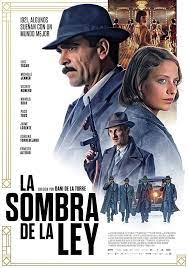
GUN CITY / LA SOMBRA DE LA LEY
Spain, 2018, 126 minutes, Colour.
Luis Tosar, Michelle Jenner, Vicente Romero, Manolo Solo, Parco Tous, Jaimi Lorente.
Directed by Dani de la Torre.
This is a striking political drama about an era in 20th century Spanish history that most non-Spaniards would not know of. It precedes the Civil War by more than a decade.
The city is Barcelona – with images of the County Cathedral still being constructed.
This is a film about politics and the police, the background of the Army and possible interventions.
The central character is rather mysterious in his entry, referred to as the Basque, joining with the local police, sharing their brutal methods, even executions. The audience sees a local police group, vigilante in its behaviour, with corrupt connections to a nightclub owner – a lavish club where wealthy celebrities of the city congregate, enjoy lavish meals, stage shows. He is called The Baron.
Military authorities in the area are ready to take over – especially with the opening sequence of a train being waylaid by armed forces and the stealing of the gun cargo from the train. The arms seem to disappear, some reappearing, The Basque intent on discovering where they were. On the other hand, the police chief of the area is a man of integrity and wants to investigate and discover the truth.
Also highlighted are the so-called anarchists, mainly union men and women who are demonstrating against injustices in the workplace. Some are in favour of peaceful negotiations. But, there are also some strong militants.
Much of this comes to a head towards the end of the film, riots, weapons used against the anarchists, the influence of the authorities and the military. There is also a revelation of who The Basque is and his mission in the turmoil of the early 1920s in northern Spain.
- Revisiting Spanish history, the early 1920s? The consequences for government in Spain, the monarchy, the buildup to the 1930s and the civil war?
- Barcelona in the early 1920s, the vistas of the city, overviews, the Mediterranean, the wharfs? The streets, buildings? Police headquarters? Government headquarters? The nightclubs and the extensive entertainment area? The Spanish countryside? The musical score? The building of the Gaudi Cathedral?
- The political situation? Anarchists and social movements? The role of the police? Military authority? The potential for Civil War?
- The opening, the fire, the attack on the train, stealing the arms? The mystery? Police investigation?
- Annibale Uriarte, mysterious presence, serious character, strong, from Madrid, joining the Inspector and his group, the torturing of the driver, killing him? His participation in the investigations? Strong arm tactics?
- The inspector, his personality, his two associates, TB and his propensity for torture, brutality? The officer and his notebook – and the later revelations? Their domination, arrests, interrogations? Brutality? Uriarte and his presence with them, participating?
- The anarchists, Leon and his militancy, Sara and her participating? The women, in the uniforms, the quiet demonstration, the cause, the Inspector and the arrests, Sara, the death of her friend? Her militancy? Salvador and his wanting dialogue, the spread of the trade unions, their causes?
- The military governor, his ambitions? The issue of the arms? The local police chief, his integrity, against brutality? The interactions with the Inspector and his group?
- The Baron, the nightclub, the range of patrons, the owner of the factory, the dancers, Lola, the star? The Baron and his power, seedy connections, the tradesmen and exploding as little girl in the sex films, Lola protecting her? The Majorcan and his being the henchman? The accountant, his connections, Lola and her pregnancy, defying the Baron? The accountant being murdered? The connections with the Inspector? Uriarte and his collaborating with the Baron? The issue of the arms of the deals?
- Uriarte, his ambiguity, helping Sara and the anarchists, the battle and the melee? The revelation about who he was, his military background? In the church, the interview with the Minister, the discussions about national security? His return, with the Baron, discovering the weapons? At the nightclub? Leon and the attack, trying to buy arms, Sara’s presence? Uriarte and his interventions? His being wounded? Sara helping him?
- The death of Salvador, Leon and his executing him, to force armed confrontation? Sara, her reaction, buying the arms at the nightclub, the realisation of the troops, killing Leon?
- Lola, Uriarte’s warning about The Baron and his killing the accountant? Her shooting him?
- The role of the military, the role of the police, corruption and integrity? A portrait of Spain in the early 1920s?